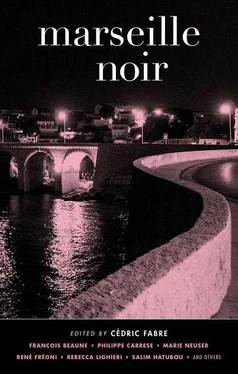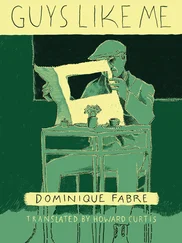Cédric Fabre - Marseille Noir
Здесь есть возможность читать онлайн «Cédric Fabre - Marseille Noir» весь текст электронной книги совершенно бесплатно (целиком полную версию без сокращений). В некоторых случаях можно слушать аудио, скачать через торрент в формате fb2 и присутствует краткое содержание. Год выпуска: 2015, Издательство: akashic books, Жанр: Крутой детектив, на английском языке. Описание произведения, (предисловие) а так же отзывы посетителей доступны на портале библиотеки ЛибКат.
- Название:Marseille Noir
- Автор:
- Издательство:akashic books
- Жанр:
- Год:2015
- ISBN:нет данных
- Рейтинг книги:5 / 5. Голосов: 1
-
Избранное:Добавить в избранное
- Отзывы:
-
Ваша оценка:
- 100
- 1
- 2
- 3
- 4
- 5
Marseille Noir: краткое содержание, описание и аннотация
Предлагаем к чтению аннотацию, описание, краткое содержание или предисловие (зависит от того, что написал сам автор книги «Marseille Noir»). Если вы не нашли необходимую информацию о книге — напишите в комментариях, мы постараемся отыскать её.
Marseille Noir — читать онлайн бесплатно полную книгу (весь текст) целиком
Ниже представлен текст книги, разбитый по страницам. Система сохранения места последней прочитанной страницы, позволяет с удобством читать онлайн бесплатно книгу «Marseille Noir», без необходимости каждый раз заново искать на чём Вы остановились. Поставьте закладку, и сможете в любой момент перейти на страницу, на которой закончили чтение.
Интервал:
Закладка:
Shut.
“So sorry to disappoint you. I’m going to leave the suitcase open. As soon as I go away, as soon as I stop making a barrier with my body, you’ll be the target of a cloud of giant wings, sugared beaks, and insatiable appetites. For the last few hours, they’ve been staring at you the way one looks at a chocolate éclair in the window of a pastry shop. Your aroma is the promise of a feast. You were good to love, good to kill, good to eat. You’re just right, my beloved carrion.”
Line. You.
“Me? Well, I’m going back down, my love. Look: I’m unzipping your plastic cover. The big white sails of birds are navigating closer and closer, and it won’t be long before they are transformed into a rain of shears. I’m going to take the path back to the port and wait for the first shuttle as I listen to the mews of ecstasy of those flying ogres behind me. Their gullets will be your last home. And I’m going back home, where I’ll take a long bath to get rid of your smell, and I’ll make myself beautiful again. Then I’ll go out and I’ll meet someone. I don’t think I’ll miss you very much. I’m not contaminated; my life is ahead of me, out there, on the other side. I will leave, my love. I’ll go away with the first man who isn’t hurt by words. With the first one, François. The first man who says, I love you.
ON BORROWED TIME
by EMMANUEL LOI
L’Estaque
It was no accident and it couldn’t have been a hallucination. An all-too-peaceful period. Miguel knew it: even after everything he’d tried for the ten years he’d been hanging around L’Estaque, he’d still wind up in deep shit.
When he first moved into the cabin he’d fixed up and covered with old boards, the neighbors confessed they were surprised that some joker out of nowhere could take root in the territory. He knew how to make himself handy, went out into the hillside, set up rabbit traps, and took on all kinds of odd jobs: repairing a fence, weeding a garden, cutting cords of wood for pizzerias. Never having idle conversations or trying to get close to people. This quiet stranger with a sad smile who didn’t bother anybody. His mystery never lost its halo. Just about nobody ever entered his shack. Unknown, and he wanted to stay that way, practically off the grid.
Today, early in the morning as boats with their muffled motors start to drift in, there’s a change. After ten years of this apparently inert way of life, two men land on L’Estaque and start combing street after street, store after store, asking about the soldier who knows how to do everything.
During that latency period — all those years undercover and not making waves — time had dug other tunnels. The two trackers with foreign accents couldn’t have predicted that: this jack-of-all-trades was protected by his discretion, in a way. He’d been accepted without anyone giving it a thought and he’d managed to blend into the landscape. Here you don’t squeal, you don’t judge, you don’t give out information to God knows what avenger. Talking about someone, informing on him, is betrayal. The past is the past, and past mistakes shouldn’t influence your judgment. If someone’s in hiding, he must have reasons for it. After four days, the whole village had identified the two thugs. Trackers, cops. Dogs who hunt deer in a pack.
Miguel’s oldest neighbor, Pierrot, who lives two houses down, opens the gate, walks around the little shack. “Hey, Miguel, there are guys looking for you.” No answer. He knocks on the door.
“Come in.”
“Two guys are looking for you. They have funny accents.”
Pierrot describes the missing little finger on the right hand and the abrupt manners of one of the two undertakers. “The other’s wooly-headed. Looks like a guy from Martinique or Reunion, light-skinned black guy.”
Miguel keeps whittling his piece of wood without raising his head.
Through the window, thirty feet away, Pierrot can see a gull trying to take off with a bloody rat dangling from its beak. He picks up the aluminum lid of a beat-up pot. The church bell rings three times.
“You checked your traps, Pierrot?”
“Yeah. Zero. I think there’s too much traffic there or we’re putting them too near the path.”
“Not the only reason.”
The neighbor realizes his curiosity won’t be rewarded. The guy’s tough as nails. It’s been a long time since people stopped setting snares for rabbits.
“If those guys keep at it, what do we do?”
“Whack ’em.”
Pierrot sits down and breaks off a piece of stale bread. He doesn’t say the prowlers have ugly mugs. No, time has changed its rhythm, the hourglass has turned over. In the termite gallery, a whole crowd gets busy. They have no leaders, they’re as old as the world. The calm of the quarry intrigues the retired fishing-boat pilot.
“You should come with me, see who they are.”
Miguel eats the fish stew and dunks pieces of bread in the aioli, then pulls on a sweater full of holes and tucks a four-pound sledgehammer into his leather carpenter’s kit.
As they walk, they avoid the terraces where pals might call out or intercept them. They know the labyrinth of dead ends and reach the jetty where Carasco rents out two rooms in his guest house. In the guidebooks, they say Cézanne used to walk here all the way from the Jas-de-Bouffan in Aix to paint and meet up with his mistress.
The landlady is reluctant to tell them where the bloodhounds went. “I don’t follow my guests around.”
Pierrot suggests they stay and wait for them. Night has fallen, there’s less activity. The carrier pigeons are bound to come back to their base soon.
An hour goes by. The neighbor dozes off in an uncomfortable chair, but the thud of a body hitting the rug jerks him awake. The four-pound hammer has left a square imprint in the skull. The body twitches twice.
“This one won’t see his islands again,” Miguel says bluntly.
“How about the other guy?”
“He ran away.”
They roll the body up in a frayed red rug, drag it out to a porch, and hide it behind a pile of cardboard boxes.
As they head back up to the cabin, Miguel discloses a few fragments of a past he would rather have left in darkness forever.
“It’s a very old story, Pierrot. Does Ouvéa ring a bell?”
The fisherman just gapes at him.
“You probably don’t remember. It was over twenty years ago. Twenty-three independence activists occupy a cave in New Caledonia. French gendarmes storm the cave on the orders of that tough little doctor — the short guy with a crew cut Chirac sent over to take care of things. ”
“Bernard Pons.”
“Yeah, that’s it. Their demands for a free Caledonia weren’t going to get to first base. Uranium, precious minerals. The gendarmes smoked out the cave. It was a bottleneck with a vertical entrance, something like a stone chimney. I was part of the squad that bumped off the activists. Since I was the wiseguy who told the press we didn’t give them a chance, they threw me in the brig. When I got out after two weeks, I beat the crap out of the master sergeant. The squad was dissolved, the whole thing was buried. That NCO was in league with two other guys. They’ve got to be the ones who’re after me. They belonged to a movement, New Empire, the new Templars. Guys nostalgic for past grandeur.”
They stop talking, listening for any suspicious noises that might indicate the return of the other guy. The night gets thicker and thicker, only letting through the sound of distant music.
“You think he’ll be back?”
“I’d better be ahead of the game. Take him by surprise. These guys aren’t gendarmes anymore. They’re hit men, hired out as mercenaries in hot spots. They miss the good old days — good for them.”
Читать дальшеИнтервал:
Закладка:
Похожие книги на «Marseille Noir»
Представляем Вашему вниманию похожие книги на «Marseille Noir» списком для выбора. Мы отобрали схожую по названию и смыслу литературу в надежде предоставить читателям больше вариантов отыскать новые, интересные, ещё непрочитанные произведения.
Обсуждение, отзывы о книге «Marseille Noir» и просто собственные мнения читателей. Оставьте ваши комментарии, напишите, что Вы думаете о произведении, его смысле или главных героях. Укажите что конкретно понравилось, а что нет, и почему Вы так считаете.












